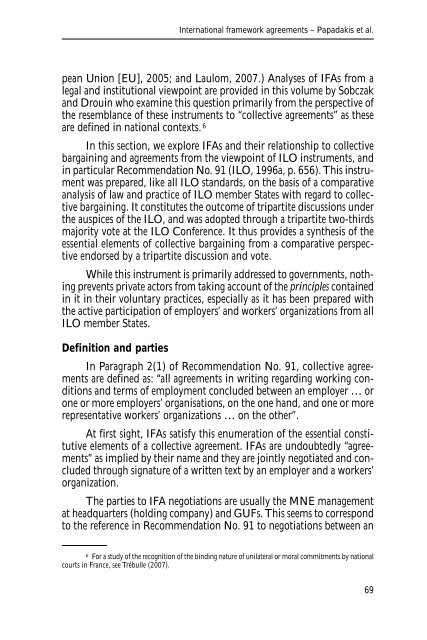CROSS-BORDER SOCIAL DIALOGUE AND AGREEMENTS: An ...
CROSS-BORDER SOCIAL DIALOGUE AND AGREEMENTS: An ...
CROSS-BORDER SOCIAL DIALOGUE AND AGREEMENTS: An ...
You also want an ePaper? Increase the reach of your titles
YUMPU automatically turns print PDFs into web optimized ePapers that Google loves.
International framework agreements – Papadakis et al.<br />
pean Union [EU], 2005; and Laulom, 2007.) <strong>An</strong>alyses of IFAs from a<br />
legal and institutional viewpoint are provided in this volume by Sobczak<br />
and Drouin who examine this question primarily from the perspective of<br />
the resemblance of these instruments to “collective agreements” as these<br />
are defined in national contexts. 6<br />
In this section, we explore IFAs and their relationship to collective<br />
bargaining and agreements from the viewpoint of ILO instruments, and<br />
in particular Recommendation No. 91 (ILO, 1996a, p. 656). This instrument<br />
was prepared, like all ILO standards, on the basis of a comparative<br />
analysis of law and practice of ILO member States with regard to collective<br />
bargaining. It constitutes the outcome of tripartite discussions under<br />
the auspices of the ILO, and was adopted through a tripartite two-thirds<br />
majority vote at the ILO Conference. It thus provides a synthesis of the<br />
essential elements of collective bargaining from a comparative perspective<br />
endorsed by a tripartite discussion and vote.<br />
While this instrument is primarily addressed to governments, nothing<br />
prevents private actors from taking account of the principles contained<br />
in it in their voluntary practices, especially as it has been prepared with<br />
the active participation of employers’ and workers’ organizations from all<br />
ILO member States.<br />
Definition and parties<br />
In Paragraph 2(1) of Recommendation No. 91, collective agreements<br />
are defined as: “all agreements in writing regarding working conditions<br />
and terms of employment concluded between an employer … or<br />
one or more employers’ organisations, on the one hand, and one or more<br />
representative workers’ organizations … on the other”.<br />
At first sight, IFAs satisfy this enumeration of the essential constitutive<br />
elements of a collective agreement. IFAs are undoubtedly “agreements”<br />
as implied by their name and they are jointly negotiated and concluded<br />
through signature of a written text by an employer and a workers’<br />
organization.<br />
The parties to IFA negotiations are usually the MNE management<br />
at headquarters (holding company) and GUFs. This seems to correspond<br />
to the reference in Recommendation No. 91 to negotiations between an<br />
6<br />
For a study of the recognition of the binding nature of unilateral or moral commitments by national<br />
courts in France, see Trébulle (2007).<br />
69
















